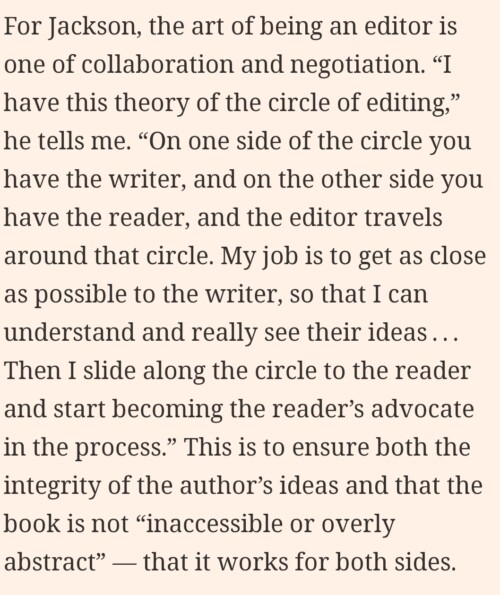Getting Editorial Help

You might decide at some point during the process that you’d like some editorial help.
This could be
- ahead of submission – although this definitely isn’t necessary
- because you’re not getting anywhere with your submission and you’d like help to improve your work
- to get some professional insight into why your submissions might not be succeeding
I know it’s frustrating that agents can’t give this insight – I do try when I think there’s something simple going on, but often it’s not simple and agents simply don’t have the time to engage editorially with every piece of work we see…we might also not be the right person to do that, you want someone who understands what you’re trying to achieve and can help you to achieve it more successfully. The lovely quote in the picture I’ve used is from a Financial Times interview with US editor Chris Jackson and I think it sums up perfectly what an editor is trying to do (the full article is here but you may need to be a subscriber).
Luckily there are many options, both free and paid, to help you.
You could do some development work by learning from books. These are some books I rate on the craft of writing which will help you to hone your skills and ensure that you have a concept that really grabs attention:
STORY GENIUS by Lisa Cron (brilliant on plotting using the psychology of your character to inform your story)
WIRED FOR STORY by Lisa Cron (brilliant on ensuring you have enough of a hook to keep your reader interested)
SAVE THE CAT WRITES A NOVEL by Jessica Brody (brilliant on plotting generally)
ON WRITING by Stephen King
INTO THE WOODS by John Yorke
THE NOVEL INSIDE YOU by Paul Magrs
MONKEYS WITH TYPEWRITERS by Scarlett Thomas
HOW TO WRITE A BLOCKBUSTER (TEACH YOURSELF CREATIVE WRITING) by Helen Corner & Lee Weatherley
Impartial feedback can be invaluable. Joining a writers’ group is a great starting point.
There are several regional writer’s initiatives you could look at which might have information about local writer’s groups, but these are often also advertised locally and it’s worth trying a few until you find one that feels right:
New Writing North
New Writing South
Writing East Midlands
National Centre for Writing
Or, you could look for some beta readers (the writing community on Twitter is lively and friendly – look at conversations under the #AmWriting #AmEditing #WritingCommunity tags to find people at a similar stage to you writing in your genre).
You’ll learn as much from critiquing other people’s work (through a writing group or as a reciprocal beta reader) as you will from receiving critiques and it will really help you to develop your craft.
Also think about your own wider reading. Start to read with an analytical eye – what has made you pick up the book you’re currently reading (it has probably got a really clear hook that piqued your interest)? Think about identifying the character’s goal and what’s at stake. What techniques does the author use to keep you hooked? Are the character’s motivations clear? How are they maintaining tension through the plot? What is driving the action? Where do the main turning points in the novel fall?
There are also a number of services (some free, some paid) available to authors to help identify and solve issues in their submissions, to assess your manuscript, or to mentor you through the development of your project. Some of these also offer more formal writing courses. They will often have an active writing community around them too which can be really helpful – find the one that feels like a good fit for you.
Children’s & YA specifically:
All Stories
Write Mentor
Golden Egg Academy
Society of Children’s Book Writers & Illustrators
Roisin Heycock Editorial Development
General (including children’s in some cases):
Black Girl Writers
Write Now
Spread the Word
Writing on the Wall
Faber Academy
Curtis Brown Creative
The Literary Consultancy
Cornerstones Literary Consultancy
The Novelry
Smart Quill Editorial
Jericho Writers
Writers HQ
Reedsy
Katie Seaman Freelance Editor and Book Coach
Other useful resources:
I Am In Print
Writers & Artists Yearbook
Undiscovered Voices (the next one will be 2024)
Bath Novel Award
There’s also a useful selection or resources that might be especially helpful to younger/beginner writers here.
Twitter can be a great place to build your confidence – there’s a lovely writing community there and several pitch contests run throughout the year for you to test out how successful your elevator pitch is and hopefully attract the attention of publishers and agents (but don’t worry if you don’t – using it to hone your pitch for general submission is really useful)…for starters take a look at the following hashtags and keep an eye out for when they’re running: #DVPit #KidLitPit #PBPitch #SFFpit #PitDark #PitchDis #LGBTNpit
Please let me know if you’ve come across any other mentor schemes or editorial services that you think it would be helpful to add here using the contact form.

